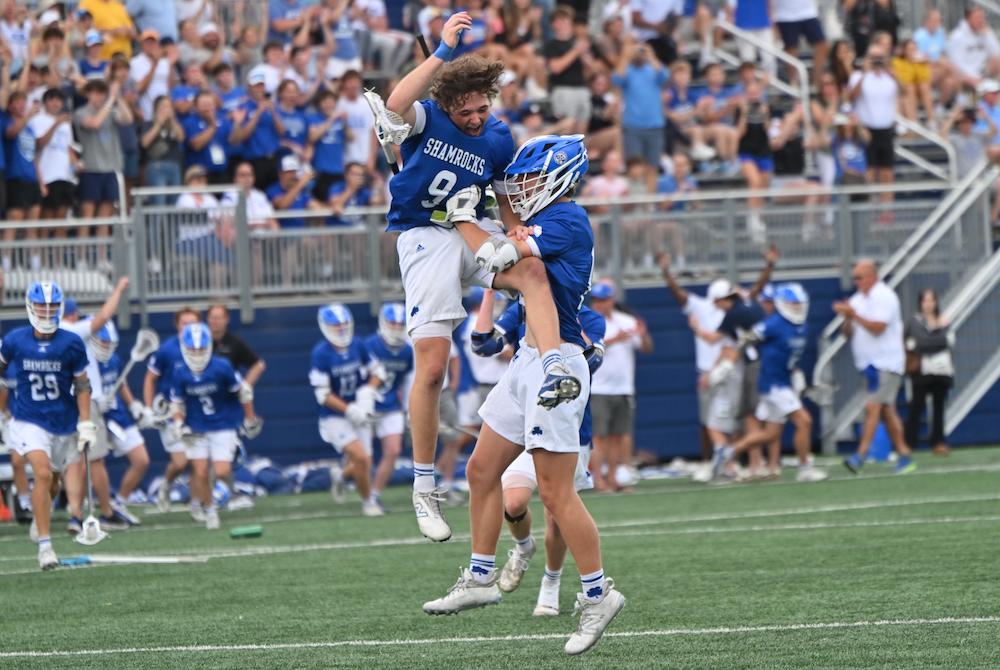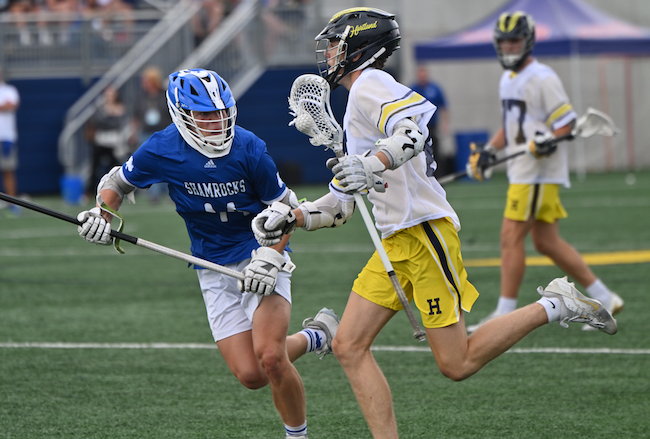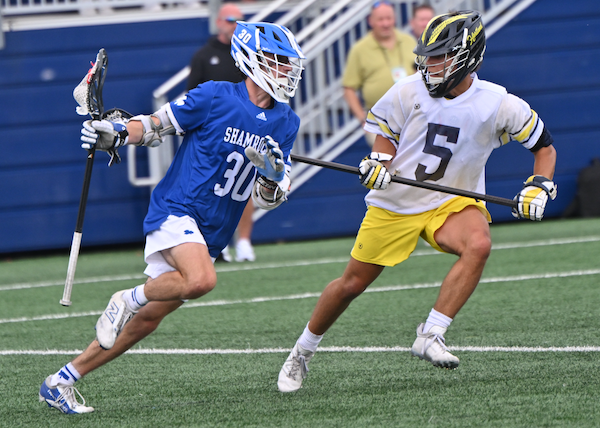
Powerful Voice for High School Sports
December 19, 2014
By Geoff Kimmerly
Second Half editor
Paul Carey was home from the U.S. Army only a few months and just shy of 25 years old when Beal City embarked on its first trip deep into the MHSAA boys basketball tournament.
On the call for local radio station WCEN from gyms at Saginaw Arthur Hill and Lansing Sexton, Carey served as the voice of the previously “laughable” Aggies as they reached the Class D Semifinals before falling just six points short of playing for the title.
“All of Beal City emptied out. They’d never had anything before,” Carey recalled during his annual Thanksgiving weekend visit to the MHSAA Football Finals at Ford Field. “When I got home, within the next two weeks I got a letter from every citizen of Beal City thanking me for broadcasting their games. That’s the kind of appreciation that meant so much.”
During 42 years on the airwaves, Carey was best known as a voice of the Detroit Tigers bounding out of transistor radios all over Michigan, thanks to WJR’s powerful signal.
But for the state’s high school sports community, his legacy is similarly memorable as the voice of the longtime football and basketball scoreboard show and a voter for various all-state teams and wire polls over the decades.
Now 86 and retired since 1991, Carey remains a regular during the first day of the Football Finals, taking in games he broadcast for the MHSAA during the late 1970s and that continue to hold his eye as they have for more than a half-century.
“It was a passion of mine. High school sports always has been,” Carey said. “I think because my dad was a high school coach, and teacher initially, and my brother was a high school coach and teacher, I just grew up in families that appreciated coaching and athletics. I was not a great athlete, but it kept my hand in following sports that way.”
Now, the scores
Carey partnered with Ernie Harwell for Tigers radio broadcasts from 1973-91, including during the march to the 1984 World Series championship. He was named Michigan Sportscaster of the Year six times and to the Michigan Sports Hall of Fame in 1992.
But Carey’s early career included sitting on top of a car, plugged into a phone pole, for a Sacred Heart football game at old Fancher Field just a few blocks from his family’s Mount Pleasant home. Among many more accolades are a Distinguished Service Award from the Michigan High School Coaches Association and a place in the Basketball Coaches Association of Michigan Hall of Fame.
In fact, the start of his weekly announcing of statewide football and basketball scores preceded his baseball career by 16 years and ended two months after he announced his final professional out.
The Michigan High School Scoreboard show was a staple of WJR’s late Friday nights from 1957-91. Carey would read every score he could collect from a variety of sources, often organized by league and with state rankings and context mixed in.
His idea came from something similar read by Len Colby for Kalamazoo’s WKZO. Carey’s brother Terry was coaching at Niles during the second half of the 1950s, and he and other coaches would get together to listen to the Friday night scores from the southwestern part of the state.
Carey, who left WKNX in Saginaw for WJR in 1956, explained to then-sports director Bob Reynolds that the station’s strong signal could provide for a truly statewide scoreboard experience.
Carey then connected with Edgar Hayes of the former Detroit Times, who gave the OK for Carey to call the paper on Friday nights to get scores from the Detroit metro area. For the rest, Carey relied on wire services – there were three at the time – who relied on newspapers from all over Michigan to call in scores over the course of an evening.
Before every Friday during high school football season – and later Tuesdays and Fridays during boys basketball season – Carey typed up lists of games based on schedules in the newspaper, with spaces to add scores. More than a few times, Carey raced down a back ramp at Tiger Stadium after a Friday night game, back to the WJR studio, with 15 minutes to prep for the show’s 11:30 p.m. start.
“If the Flint Journal, the Grand Rapids Press, the Traverse City paper didn’t call in scores to the AP, then I was out of luck too. And that happened all the time,” Carey said. “I would call back occasionally, say, ‘Did you get anything more?’ It was a rat race.”
The show originally was set for 10 minutes and then extended to 15. American Airlines sponsored a record show that followed, and Carey’s scoreboard show had a sponsor only once in 35 years. Finishing up on time was expected, even with more than 200 scores to read.
But Carey said he always went 20 minutes, sometimes 25.
“Because I wasn’t done. I just kept right on going,” Carey said. “Jay Roberts did the all-night show most of the time, and he was patient with me. He didn’t say too much on the air about ‘that guy ahead of me took all of my time.’”
Carey continued the “rat race” until his final scoreboard show, Dec. 20, 1991. He retired from WJR at the end of that calendar year. And it's important to note: Carey was never paid a dime extra for doing the program. .
“I think Paul is really just a sports fan, and that came across to the listener on his broadcasts,” MHSAA historian Ron Pesch said. “Paul would gather as much as possible off the wire. He'd interject if scores were missing from sections of the state. Press polls from the Free Press, News, AP and UPI were big, so he could point out close calls and upsets.
“He provided immediacy, or the closest thing to it in the days before cable TV and the Internet, and because of his scoreboard show, you could get the results before the morning paper. For listeners, he brought life to something as simple as game scores.”
First team all the way
Carey, who resides in Rochester, also served as the engineer on Tigers broadcasts for 16 years, through 1990. He broadcast Pistons games on the radio for six seasons and did the first broadcast of a Central Michigan University football game, in 1949.
Harry Atkins, covering Detroit’s teams while with The Associated Press for 29 years including the last 21 as its sports editor for Detroit, took note of his colleague's hard work – and especially that Carey was one of few broadcasters who was a journalist in addition to a voice.
That made Carey's other major role in high school sports a natural fit.
Atkins split The Associated Press all-state selection panels for football and basketball into 11 regions, and Carey represented the Detroit area for a number of years. He also was a longtime voter in those sports' weekly polls.
“Paul is just that kind of guy. He thought it was important and he made time in his busy schedule to do it,” Atkins said “And it had an impact on the other 10 voters on the All-State panels, too.
“Some of them were from small out-state newspapers or radio or TV stations. Yet every one of them knew who Paul Carey was. And when he spoke, of course, with what often is called "The Voice of God," those voters paid attention.”
And he still does, as well.
At the end of each fall, Carey still puts together a compilation of the three high school all-state football teams – Associated Press, Detroit Free Press and Detroit News – and files them with years of research and results.
“It’s important to me. Nobody sees it but me, but I get a certain kick,” Carey said. “Once in a while I’ll see a kid playing at Central, Western or (Michigan) State or Michigan, and they’ll say he came from Clawson. I’ll go into my all-state collections, say that would’ve been 2009 he played, and I find a name.”
In addition to the Football Finals on WJR, Carey was part of the Baseball Finals broadcasts into the early 1990s, continuing to contribute even after his retirement from his fulltime gig.
He spent high school games over the years sitting next to legends like the Free Press’ Hal Schram and remembers when current Free Press longtime scribe Mick McCabe was just a rookie. One of Carey's final broadcasts was a 1992 Baseball Final with his nephew Mike Carey, who continues to broadcast MHSAA championship games to this day.
“I am eternally grateful to Paul Carey. His contribution to high school sports in Michigan has been great and significant,” Atkins said.
“We are lucky to have him.”
PHOTO: Paul Carey (left) and nephew Mike Carey broadcast the MHSAA 1992 Class D Baseball Final between Hillman and Athens for PASS.

Quick 2nd-Half Strike Sparks Detroit Catholic Central to Comeback Win
By
Drew Ellis
Special for MHSAA.com
June 8, 2024
ANN ARBOR – The Detroit Catholic Central offense knew what it was capable of – but just needed to show it.
After being shut out in the first period of Saturday’s MHSAA Division 1 boys lacrosse championship game at University of Michigan, and trailing 6-3 at the break, the Shamrocks needed a spark.
That spark came in the form of a Lachlan Moffatt goal just 13 seconds into the second half, which started an 11-2 run for DCC on the way to a 14-8 victory.
“Hartland was playing really well. We just weren’t capitalizing, which is really kind of strange for us. I think when we got that first goal of the third quarter, that really changed the complexion of the whole thing,” Detroit Catholic Central coach Dave Wilson said.
Even after the Moffatt goal, the Shamrocks (21-3) still didn’t take the lead until late in the third quarter. Senior midfielder Matthew Aleva would fire off a laser that found the back of the net with 4:14 to play in the period, tying the game at 7-7.
Minutes later, Aleva would take a pass from Moffatt and find the net again to give the Shamrocks their first lead – one they wouldn’t relinquish.
 “They were big and I knew we needed to swing the energy on to our side,” Aleva said of his two goals. “We had to rally back and come out in the second half with a Game-7 mentality. We found that energy and we made sure to play the way we know we could.”
“They were big and I knew we needed to swing the energy on to our side,” Aleva said of his two goals. “We had to rally back and come out in the second half with a Game-7 mentality. We found that energy and we made sure to play the way we know we could.”
The Shamrocks won all 14 faceoffs in the second half, which allowed them to control possession most of the final two periods and take a 32-8 shot advantage over Hartland (19-4).
“Faceoffs had a lot to do with it. At the end of the day, (Catholic Central) had a couple of strong draw guys who are really talented players,” Hartland coach Nick Levanti said. “You have to come out with other ways to win, whether it is winning possessions, winning ground balls, tying it up, clearing better. Ultimately, I felt (Catholic Central) came out hungrier to do those little things.”
It was Hartland that looked hungrier during the first half. The Eagles took a 3-0 lead after a quarter of play, thanks in large part to the play of freshman goalie Nate Anderer. He made six saves in the first period and finished with 19 for the game.
“He’s always locked in, and he’s a great player,” Levanti said of Anderer. “That’s a performance you can expect him to give. He has that type of capability in any game.”
With Catholic Central not finding the net at its accustomed frequency, it relied less on its passing to score and worked individual battles. Seven of the 11 second-half goals were unassisted.
“Every game takes on its own personality. We weren’t moving off-ball well, so guys had to really take it on their own and stick the ball in the net, and they did,” Wilson said.
 Luke Zajdel led Catholic Central in scoring with five goals, four of which came in the second half. Moffatt finished with three goals and two assists, while Francisco Williams and Aleva each had two goals.
Luke Zajdel led Catholic Central in scoring with five goals, four of which came in the second half. Moffatt finished with three goals and two assists, while Francisco Williams and Aleva each had two goals.
Hartland was led by Dylan Ayotte, who had two goals. Easton Culver had one goal and two assists for the Eagles.
Saturday marked the first time the Division 1 Final didn’t feature Bloomfield Hills Brother Rice. The Warriors had appeared in every D1 Final since the sport received MHSAA sponsorship in 2005.
The only two Finals Brother Rice had lost came against Catholic Central (2018) and Hartland (2022), respectively.
Catholic Central became the first program aside from Rice to win multiple MHSAA Division 1 titles.
“It’s sheer dedication to try and get to this game every year,” Wilson said. “It requires a ton of commitment and skill and unselfishness and learning how to be coachable. These guys did it. We felt that early on, that these guys had the potential to do that.”
PHOTOS (Top) Detroit Catholic Central celebrates its Division 1 championship Saturday. (Middle) A Hartland player brings the ball upfield while DCC's Brody Wojcik defends. (Below) The Shamrocks' Matthew Aleva (30) makes a move as Hartland's Braden Streight defends.

